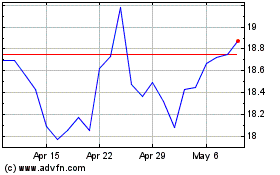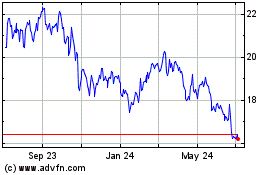Mattel Shares Tumble After Reporting Weak Holiday Sales -- 2nd Update
January 25 2017 - 9:39PM
Dow Jones News
By Paul Ziobro
Last minute shoppers ruined Christmas for the toy industry.
After posting disappointing fourth-quarter results, Mattel Inc.
executives on Wednesday blamed deep discounts in the waning days
before Christmas that were needed to help retailers clear unsold
Barbie dolls, Hot Wheels sets and other toys.
The move revived lackluster sales for Mattel and the overall toy
industry, but at a steep cost in profits. Mattel, the largest U.S.
toy maker by sales, reported a 19% drop in earnings during its
critical fourth quarter. The company reported a week earlier than
planned, and Mattel shares fell more than 10% in late trading to
$28.33.
"It was a fairly ugly end to the quarter," said Chief Executive
Christopher Sinclair, who last week announced plans to step
aside.
The disappointing results marred what had otherwise seemed like
a return to stability at Mattel under Mr. Sinclair. Instead, the
company's turnaround efforts will be handed over to Margaret
Georgiadis, a former Google executive who next month becomes
Mattel's third CEO in as many years.
Shoppers did come out during the Black Friday holiday weekend,
but during the first three weeks of December, toy sales fell 7%,
Mr. Sinclair said Wednesday. "That's when the retail environment
became turbulent," he said on a conference call.
Retailers struggled with the sales cadence as well. Toys "R" Us.
Inc. Chief Executive David Brandon last week said that the loss of
momentum in the toy category caused its competitors to discount
aggressively, hurting its overall business. Sales for its holiday
period fell 2.5% in the U.S. at stores open at least a year.
The holiday season can easily derail an otherwise successful
year in the toy industry, as roughly half of retail sales occur in
final months. Mattel executives worked with worried retailers to
offer aggressive discounts to get people shopping.
"Because of a very short time frame, we had to activate and
execute these programs," Mattel President Richard Dickson said. "We
didn't know the financial impact until after year-end."
Mattel logged about 20% of its sales for the quarter in that
final week. But the pain was felt on the gross margin, which fell
to 47% from 50.2% last year.
Toy sales are also quickly shifting online, creating additional
challenges for retailers. One Click Retail, a research firm,
estimated that Amazon.com Inc.'s toy sales rose 24% last year, more
than three times faster than the overall industry.
The shift to online shopping not only increases price
transparency but it reduces shopper visits to stores, which saps
toy makers and retailers of impulse purchases.
"Holiday 2016 taught us that extra shopping days and earlier
online promotions don't necessarily translate to more overall
sales," said Juli Lennett, toys industry analyst at NPD Group.
Mattel's fourth-quarter profit fell 19% to $173.8 million, or 50
cents per share. Global sales declined 8.3% to $1.83 billion, hurt
by the loss of the Disney Princess dolls business to rival Hasbro
Inc. as well as currency swings. In North America, net sales fell
7%.
Excluding expenses related to acquisitions or asset sales,
restructuring costs or currency devaluations, Mattel reported
adjusted earnings of 52 cents a share for the quarter. On that
basis, analysts were expecting Mattel to report a profit of 71
cents a share.
The report also dragged down rival toy maker Hasbro Inc., whose
shares fell 4% in late trading. Hasbro is scheduled to report its
fourth-quarter results Feb. 6.
Write to Paul Ziobro at Paul.Ziobro@wsj.com
(END) Dow Jones Newswires
January 25, 2017 21:24 ET (02:24 GMT)
Copyright (c) 2017 Dow Jones & Company, Inc.
Mattel (NASDAQ:MAT)
Historical Stock Chart
From Mar 2024 to Apr 2024

Mattel (NASDAQ:MAT)
Historical Stock Chart
From Apr 2023 to Apr 2024
